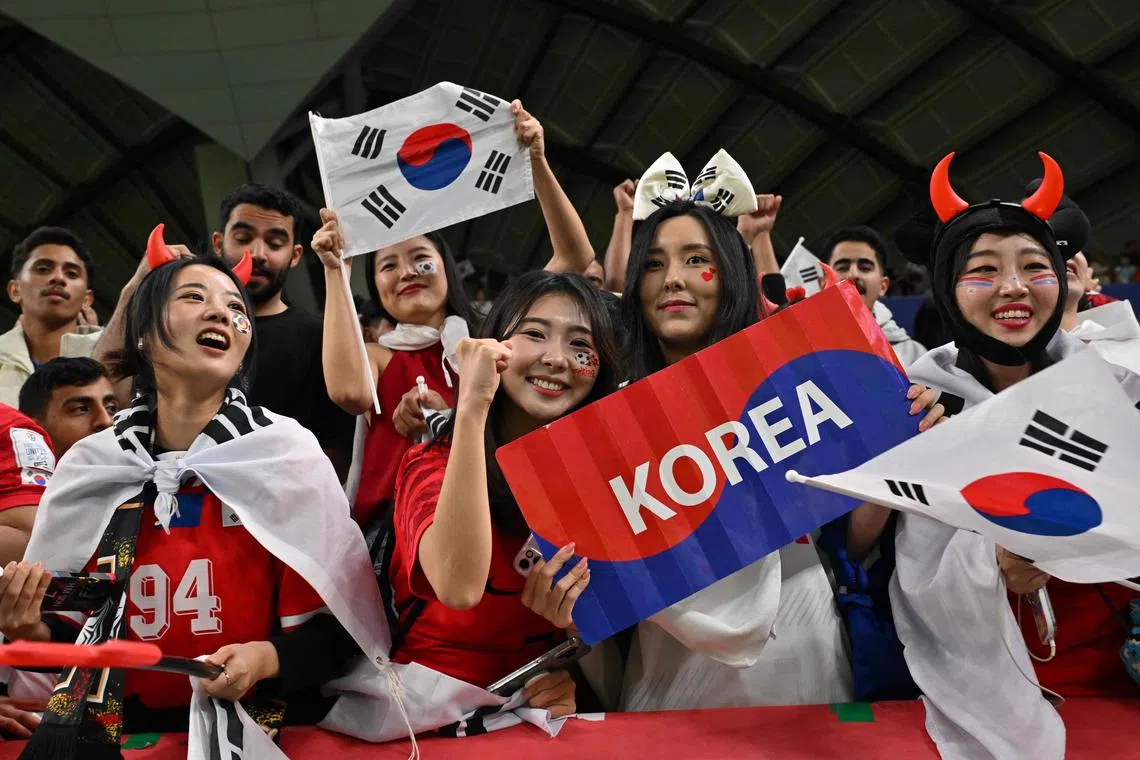Women outnumber men in South Korea’s sport stadiums
Sign up now: Get the biggest sports news in your inbox

South Korea's female supporters celebrate after their team beat Australia in the Asian Cup, in al-Wakrah, south of Doha, on Feb 2.
PHOTO: AFP
SEOUL – Each time South Korea scored against Singapore during a recent 5-0 rout in a football World Cup qualifier, the roar from the home crowd came largely from women, who held nearly two-thirds of the tickets.
In the Seoul World Cup Stadium that November day, a billboard-size banner for star striker Son Heung-min had been made by a women-only group. There was also a banner for one of his teammates with the words “Cho Gue-sung wins the day”.
The scene illustrated a fact that has puzzled experts in one of the world’s most patriarchal societies. In sport, South Korean women generally outnumber men in the stands.
Women in South Korea make up 55 per cent of fans at professional sporting events, including baseball, basketball, football and volleyball, according to a 2022 estimate by the Korea Professional Sports Association.
Similar estimates for major sports in the United States put the figure at less than half for women. In Britain and Australia, that number drops to a quarter or less.
Fans and sport experts attribute South Korea’s high rate of female fandom partly to the sense of security at the country’s sport venues. Others say it is influenced by a national fan culture powered by intense worship of stars, who are in some cases heart-throbs.
“People don’t think of the players as athletes, but as celebrities,” said Yim Su-bin, 24, who attends games and fan meet-ups, and watches baseball on TV every day of the season. “It’s not much different from the way K-pop fans follow their idols.”
In South Korea, where modern sports like baseball and football were introduced in the late 19th century, professional leagues were a product of brisk economic growth that began in the 1960s and created a large middle class. The leagues matured in tandem with the hosting of major international competitions, including the 1988 Summer Olympics and the 2002 men’s football World Cup.
Women have long been part of a South Korean fan base that considers following sport a national pastime, glorifying elite (and usually male) athletes who compete abroad. In the 1970s, the man of the moment was Cha Bum-kun, who scored 98 goals for two clubs in Germany’s top football league. Now the sport idol is Son, a striker for Tottenham Hotspur in the English Premier League.
Female fans have been present at domestic competitions for just as long. One explanation for South Korea’s high rate of female fandom is that its arenas are safe places to watch a game. A growing number of venues now offer family-friendly amenities, including children’s playrooms.
In that atmosphere, fighting and other expressions of hooliganism are increasingly rare, said Cho Yi-jin, a postdoctoral researcher at Yonsei University in Seoul.
“There’s less smoking, drinking and swearing than before,” she said. “There’s a friendlier vibe.”
Another factor, experts say, is the intense domestic fan culture that permeates the country’s entertainment culture.
The meteoric rise of global interest in South Korean films, dramas and music over the past decade or so created a passionate fan base around celebrities whose success is seen as a mark of national pride.
Now the same slang that describes how superfans worship such idols – “deok-jil”, or “fangirling” – is widely used for sport. Fan girls travel across the country to attend games, send coffee trucks to practice as a show of support and snap photos of players with powerful zoom lenses from front-row seats.
The teams’ marketing departments have noticed. There is no shortage of merchandise for women, including jerseys and headbands. But it is not all superficial. Several female fans said that, while male players had been their gateway to sport, they eventually developed a deeper appreciation of the game itself.
Celine Lim, 39, said she started watching Kim Byung-hyun, a Korean baseball pitcher, play for the Boston Red Sox when she was living in the United States partly because she was drawn to his “bad boy” personality. She kept watching his Korean team, the Kiwoom Heroes, play almost every game even after he retired.
Han Na-gyeong, 26, said her interest in football deepened while watching Son play for Tottenham. Now, even as a busy university student, she makes time to follow each player on the team. She said she has several friends whose fandom has taken a similar turn.
“Gradually, they became more sincere about the sport itself than anyone else,” she said. NYTIMES


